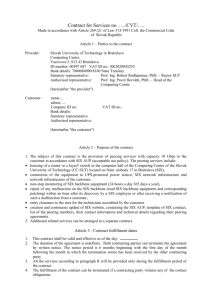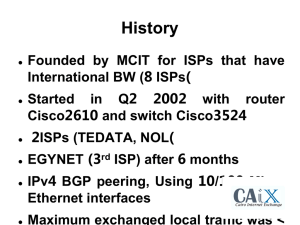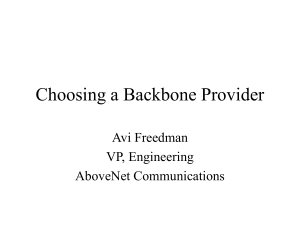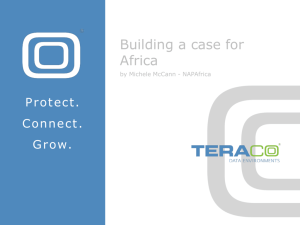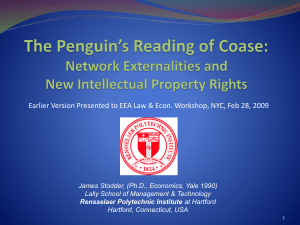Peering Concepts and Definitions Terminology and Related Jargon
advertisement
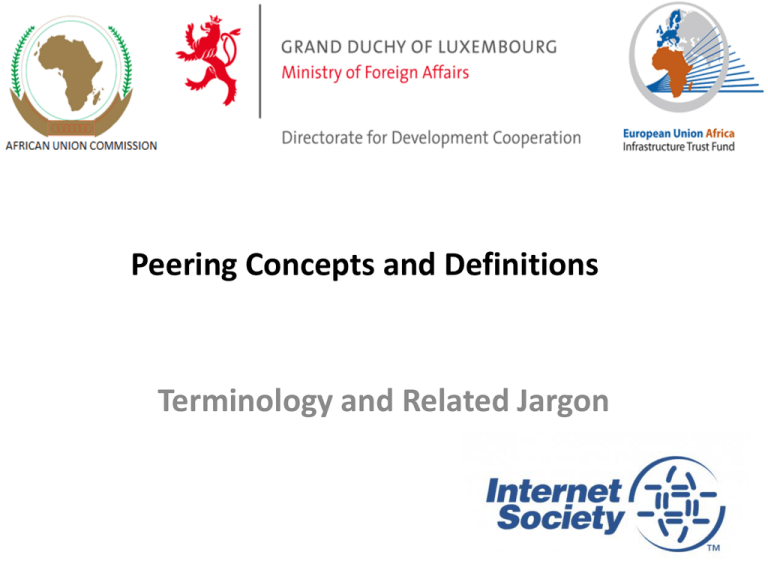
Peering Concepts and Definitions Terminology and Related Jargon Presentation Overview Brief On Peering Jargon Peering & Related Jargon BRIEF ON PEERING JARGON Brief On Peering Jargon A lot of terminologies used in the peering game. We shall look at the more common ones. Will be directly related to peering, as well as ancillary non-peering functions that support peering. PEERING & RELATED JARGON Peering & Related Jargon ASN (or AS - Autonomous System Number): A unique number that identifies a collection/grouping of IP addresses or networks under the control of one entity on the Internet Bi-lateral (peering): Peering relationships setup “directly” between two networks (see “Multi-lateral [peering]”). BGP (Border Gateway Protocol): Routing protocol used on the Internet and at exchange points as the de-facto routing technique to share routing information (IPs and prefixes) between networks or between ASNs Peering & Related Jargon Carrier-neutral (data centre): A facility where customers can purchase network services from “any” other networks within the facility. Cold-potato routing: A situation where a network retains traffic on its network for as long as possible (see “Hot-potato routing”). Co-lo (co-location): Typically a data centre where customers can house their network/service infrastructure. Peering & Related Jargon Dark fibre: Fibre pairs offered by the owner, normally on a lease basis, without any equipment at each end of it to “activate” it (see “Lit fibre”). Data centre: A purpose-built facility that provides space, power, cooling and network facilities to customers. Demarc (Demarcation): Typically information about a co-lo customer, e.g., rack number, patch panel and port numbers, e.t.c. Peering & Related Jargon DFZ (Default Free Zone): A situation where networks run their routers with the full Internet BGP routing table and no default route. De-peer: A situation where a network terminates a peering relationship with another (see “peer”). Downstreams: Typically a network’s customers (see “Upstreams”). Eyeballs: End-users of a network that are typically requesting content off online resources. Peering & Related Jargon Facility: May be synonymous with a data centre or co-lo site where networks house their infrastructure. Full circuit: A link provided by a network operator as an end-to-end connection between two points of interest to the customer (see “half circuit”). Half circuit: One end of an end-to-end circuit that is provided halfway the distance, before it is picked up by another network operator for completion (see “Full circuit”). Peering & Related Jargon Hot-potato routing: The ability of a network to hand traffic off to other networks at earliest possible moment (see “Cold-potato routing”). Interconnect charges: Monies paid by peering parties for them to interconnect, e.g., cost of cabling. IPLC: International Private Leased Circuit – a leased line that spans two or more countries. IRU: Indefeasible right of use (IRU) is a contractual agreement between fiber optic infrastructure operator (submarine or terrestrial) and a client for purchase of capacity for any legal use. Peering & Related Jargon Looking glass: A device/resource that permits anybody that is interested to analyze a network’s view of the Internet. Lit fibre: Fibre pairs owned by network operator who has attached equipment at either end to generate bandwidth from them (see “Dark fibre”). Mandatory (peering): A situation where members at an exchange point are “forced” to peer with one another. Peering & Related Jargon Mbps (Megabits Per Second) Measurement of speed of a link (1000Mbps = 1Gbps) MB (MegaBytes) Measurement of volume of data transferred (1MB = 0.125Mb and 1000MB = 1GB) MMR (Meet Me Room): A centralized passive, cable switching panel in a data centre where interconnects between networks occur. Multi-lateral (peering): Peering with a group of networks through a single negotiated policy (see “Bi-lateral peering”). Peering & Related Jargon No peering (policy): A network implementing this general policy is not interested in peering with any other network (see “Open, Selective, Restrictive [peering policies]”). Off-net (traffic): Traffic that is handed off to another network at some point in its flight. On-net (traffic): Traffic under the control of the same network, i.e., the origination and termination of traffic remains on the same network. Peering & Related Jargon Open (peering policy): A network implementing this general policy is happy to peer with any other network without restriction (see “No, Selective, Restrictive [peering policies]”). Paid peering: Is similar to Transit where one network pays another for access to its backbone, but here, the network being paid provides connectivity only to its customers, and not the whole Internet. Peer: A network with whom you exchange traffic. Peering: The act of exchanging traffic with a peer. Peering & Related Jargon Peering co-ordinator: An individual within an organization that handles all peeringrelated matters for that network. Peering policy: A set of guidelines by which network operators will peer with external networks. PoI (Point of Interconnect): A location, mutually agreed on by peering parties, where peering will occur. Private peering: Peering that does not typically involve any public exchange points, i.e., back-to-back agreements (see “Public peering”). Peering & Related Jargon Public peering: Peering typically done across a public exchange point (see “Private Peering”). Restrictive (peering policy): A network implementing this general policy is normally not interested in peering with any other networks (see “No, Open, Selective [peering policies]”). Route registry: A centralized database that contains routing information, e.g., prefixes, AS_PATH’s, ASN’s, e.t.c. Peering & Related Jargon Route server: A centralized router at a public peering exchange point that is able to serve all member routes via a multi-lateral peering strategy. Selective (peering policy): A network implementing this general policy is normally happy to peer provided a minimum set of criteria are met (see “No, Open, Restrictive [peering policies]”). Settlement-free peering (a.k.a SFI): Neither party pays the other for the exchange of traffic. Settlement-based peering: One of the networks pays the other for the exchange of traffic (see “Transit”). Peering & Related Jargon Traffic ratio: The balance between how much traffic a network sends to its peers vs. what it receives from them. Transit: A service where a network pays another for access to the global Internet. Transit-free: A situation where a network does not purchase any Transit from any other network, and yet “usually” has a full view of the global Internet. Upstreams: Typically networks to whom you hand-off traffic and pay a fee, e.g., Transit providers (see “Downstreams”). Acknowledgement and Attribution This presentation contains content and information originally developed and maintained by the following organisation(s)/individual(s) and provided for the African Union AXIS Project Mark Tinka: - mtinka@psg.org END
